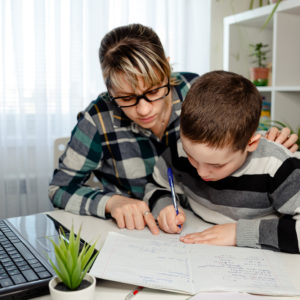The rhythms of school life — summer vacation, back-to-school shopping, athletics, graduations — all used to be as predictable as the sunrise, but not anymore thanks to COVID-19.
The new uncertainty is fueling an unprecedented surge in parents who are looking at making the leap into full-time homeschooling.
“From May 1 to June 30, my [Facebook] group gained just under 100 members, compared to around 30 new members over the same period in 2019,” said Beth Chiang, who runs a Montgomery County homeschooling Facebook group. “While we always see an uptick in membership before the start of a new school year, this year has been noticeably different.”
A recent poll cited by USA Today noted that “6 in 10 [parents] say they would be likely to pursue at-home learning options instead of sending back their children this fall.” And even if parents are ready, about 20 percent of teachers in a similar poll weren’t sure they they’d be willing to come back.
Jennifer Fauls, also in Montgomery County, was a public school teacher for many years and a homeschooler for eight. Her expertise in both categories led her to found the Little Tree Homeschool Center, which offers “homeschool coaching.”
“The client is able to ask whatever questions they have, whether it be paperwork, or if they’re having issues with the school district, we can muddle through it,” Fauls told Delaware Valley Journal.
“I have a lot of families with basic questions like, ‘How do you set up your house? How do you handle socialization? What can the school district provide me?’ So that’s a big part of my center.”
Some of the mystery surrounding homeschool was swept away by the COVID-19 crisis, when public schools sent kids home for “remote learning.” As a result, many more parents have hands-on experience with teaching at home. For some, the experience may have been a pleasant surprise. For others…
“It’s what I call crisis homeschooling,” Fauls quipped, when parents were thrown sink-or-swim style into homeschooling when public schools were closed in March.
But once the initial panic subsided, parents could see the benefits that come with homeschooling, says Colleen Hroncich, a homeschooling mom and an education policy analyst with the Commonwealth Foundation in Harrisburg.
“Parents are seeing what their kids actually do, and they’re seeing how much time is wasted in a day in a typical school setting,” Hroncich told Delaware Valley Journal.
“You can get the same amount of work done in a much shorter time. You can also let your kids work longer on the things they need to work longer on,” she said. “Whereas in a school setting — the bell rings, you’re done, whether you understood what was covered that day or not.”
“On the flip side, if something’s super easy, you don’t have to sit there seeing it over and over again for 43 minutes. You see that your child understands it, you move on to the next thing.”
Above all else, Chiang, Fauls and Hroncich all said homeschooling relies on community, parents and students who come together to organize activities while offering moral and technical support.
“Even if in-person gatherings are vastly diminished this year, a local group can help answer questions about following the law, as well as recommend curricula and enrichment opportunities,” Chiang said.
“We are used to being out and about in the world: visiting museums, getting together at playgrounds, volunteering in the community, cooking with friends, attending homeschool classes or co-ops, etc.,” Chiang added. “This year, much of that will be restricted for us and for people trying homeschooling for the first time. I worry that this could cause the untrue stereotypes of ‘unsocialized’ homeschoolers to be reinforced.”
“We call it never-at-home-schooling,” Hroncich joked. Her children participated in a national debate contest which she described as a “phenomenal” experience.
Viewed through the political lens, Hroncich says homeschooling has gone through cycles over the years.
The stereotype is that homeschooling is for politically conservative families, but that’s changing, Hroncich says.
“It definitely was conservative Christians I would say, that were the bulk of homeschoolers for a good while. But in the last decade or so, I think it’s become much more diversified,” she said.
And the driving factor making homeschooling more diversified? Technology.
“It’s easier to connect with people. It’s easier to get curriculum. I have nothing but respect now for people who homeschooled before the internet,” Hroncich said over her own laughter.

